Crossway D.A. Carson Collection (7 vols.)
Digital Logos Edition
Overview
Respected biblical scholar D.A. Carson presents a varied and faithful collection of biblical teaching on various subjects regarding Christology, bibliology, and the Christian life. With these resources, modern pastors and teachers will be able to deepen their own understanding of the gospel, its implications for Christians, and its meaning for a lost world. Readers will find new insights that will make their ministry more relevant and effective when encountering doubting, unbelief, and faithlessness. Carson provides answers to questions about Jesus and his work on the cross, the role of pastors in their God-ordained setting, and examines love from a scripturally faithful perspective.

Key Features
- Provides insightful and practical teaching from beloved and distinguished scholar D.A. Carson
- Includes rich expositions of scripture designed to assist readers in biblical application
- Presents Carson’s reflections on the Christian life, essays, lectures, and insightful biblical exegesis
Product Details
- Title: Crossway D.A. Carson Collection
- Publisher: Crossway
- Volumes: 7
- Pages: 1,552
- Christian Group: Evangelicals
- Resource Type: Collected Works
- Topic: Biblical Theology
Individual Titles
- Collected Writings on Scripture
- Here Is Our God: God’s Revelation of Himself in Scripture
- Jesus the Son of God: A Christological Title Often Overlooked, Sometimes Misunderstood, and Currently Disputed
- Memoirs of an Ordinary Pastor: The Life and Reflections of Tom Carson
- Scandalous: The Cross and Resurrection of Jesus
- Love in Hard Places
- The Gospel as Center: Renewing Our Faith and Reforming Our Ministry Practices
This title is included in the following collections
You can save when you purchase this product as part of a collection.
Crossway D.A. Carson Collectio...
$265.82$212.99Crossway Top Author Collection...
$1,169.02$875.99
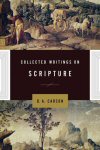
God’s Word has always had enemies, but in recent years the inspiration and authority of Scripture have been attacked with renewed vigor. Respected scholar D.A. Carson has written widely on the nature of Scripture over the past thirty years, and here presents a timely collection of his work in two parts.
In part 1, Carson selects essays written on such themes as how to interpret the Bible, recent developments in the doctrine of Scripture, unity and diversity in the New Testament, and redaction criticism. Presenting a theologically balanced and confessional perspective, Carson defines the terms of a number of debates, critiques interpretive methods and theories, and suggests positive guidelines for future action.
Part 2 presents critical reviews of nine books dealing with the inspiration and authority of Scripture. Though substantial in content, Carson’s detailed reviews will foster careful thought and perspective in those who are relatively new to the debates surrounding biblical inspiration and authority.
This volume is a diverse collection that will prove to be a helpful resource to both seasoned pastors and scholars and those who are just starting serious study of the Bible.
This book is a road map of pathways to pursue and pitfalls to avoid in handling Scripture. D.A. Carson would be the first to agree that God himself upholds his written word, the Bible. But God uses means. In recent decades, Carson’s voice has been among the most forthright, consistent, rigorous, faithful, and compelling in serving the vital divine end of testifying to Scripture’s veracity. This book guides readers to the priceless destination of confidence in God’s Word through refutation of its critics and commendation of its truth.
—Robert W. Yarbrough, professor of New Testament, Covenant Theological Seminary
D.A. Carson is one of the most prolific and profound biblical scholars of our generation. Perhaps it is not far-fetched to predict that his Collected Writings on Scripture will become a classic as an evangelical defense of Holy Scripture’s authority. Carson courteously but persuasively reveals the weaknesses of arguments designed by critics to discredit or render obsolete the historic teaching of the Western Christian churches, namely, biblical inerrancy. This book is a masterful, must read for those persons who want to understand better the nature of Scripture’s authority. The volume may very well take its place as a benchmark study, side by side with Inspiration (1881), the influential essay penned by A. A. Hodge and B. B. Warfield.
—John D. Woodbridge, research professor, church history and History of Christian thought, Trinity Evangelical Divinity School
D.A. Carson is for this generation what B. B. Warfield was for his—the scholarly stalwart for the doctrine of Scripture, possessed of prodigious skills both as an interpreter of Scripture and as a biblical and systematic theologian, critically engaging the most significant arguments of the day and upholding the historic position of the Christian church and the Bible’s own self-attestation. Everything that comes from his pen is worthy of careful attention. Given the current state of the doctrine of Scripture (in theory and practice) in evangelical academia, this is an important and timely volume. Seminarians and pastors alike need to be abreast of present trends in this vital subject. The classic essays and critical reviews in this book offer a bird’s-eye view of the past thirty years of the discussion, as well as world-class scholarship and discernment in articulating rejoinders to sub-biblical theories while positively presenting a faithful view of the inspiration and authority of the Scriptures and their entailments.
—J. Ligon Duncan, chancellor and CEO, Reformed Theological Seminary, Jackson, Mississippi

Here Is Our God: God’s Revelation of Himself in Scripture
- Authors: D.A. Carson, Kathleen B. Nielson, Nancy Leigh DeMoss, Timothy J. Keller, John Piper, Jenny Salt, Carrie Sandom, Paige B. Brown
- Editors: Kathleen B. Nielson and D.A. Carson
- Series: The Gospel Coalition (TGC)
- Publisher: Crossway
- Publication Date: 2014
- Pages: 224
Scripture records a number of instances in which God visibly revealed himself to his people, offering a glimpse of his stunning beauty and overwhelming glory. These awe-inspiring manifestations of God’s presence—known as “theophanies”—give us wonderful insights into his character, will, and salvation.
In this collection of biblical expositions, eight prominent Bible teachers explore key passages in which God displayed himself in a spectacular revelation. From the giving of the law at Mt. Sinai to Christ’s glorious transfiguration, the passages examined in this book challenge us to look afresh at our God—that we might truly know, love, and serve him.
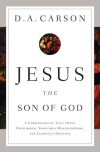
Although it is a foundational confession for all Christians, much of the theological significance of Jesus’s identity as “the Son of God” is often overlooked or misunderstood. Moreover, this Christological concept stands at the center of today’s Bible translation debates and increased ministry efforts to Muslims. New Testament scholar D.A. Carson sheds light on this important issue with his usual exegetical clarity and theological insight, first by broadly surveying Jesus’ biblical name as “the Son of God,” and then by focusing on two key texts that speak of Christ’s sonship. The book concludes with the implications of Jesus’ divine sonship for how modern Christians think and speak about Christ, especially in relation to Bible translation and missionary engagement with Muslims across the globe.
No christological designation is as essential as ‘Son of God’; none is more important. This study makes that impressively clear by sound and careful exegesis and theological reflection in the face of misunderstandings and disputes, past and current. Once again, D.A. Carson serves the church well.
—Richard B. Gaffin Jr., professor of biblical and systematic theology, emeritus, Westminster Theological Seminary
I know what it is to reject Jesus as the ‘Son of God.’ As a former Muslim, nothing baffled and, quite frankly, angered me more than hearing Christians call Jesus ‘the Son of God.’ I thought such persons were blasphemers worthy of condemnation. But now, nothing gives me more joy than to know that Jesus is indeed the Son of God and that the title ‘Son of God’ carries far more truth and wonder than I could have imagined. So I welcome this volume from D.A. Carson with all the enthusiasm and joy of one who once denied the truth that Jesus is the Son of God. With his customarily clear, warm, careful, and balanced manner, Carson gives us a fresh exploration of a precious truth that so many Christians take for granted and so many Muslims misunderstand. If you want to know Jesus and the Bible better, this surely is one aid that will not disappoint.
—Thabiti M. Anyabwile, pastor, Anacostia River Church, Washington, D.C.
What does it mean for us to confess that Jesus is the Son of God? D.A. Carson tackles this question in Jesus the Son of God. In this little book he lays a firm foundation to help the church understand ‘Son of God’ with reference to Jesus. After considering uses of ‘Son of God’ in Scripture, both in general and when applied to Jesus, Carson models the way systematic theology should be based on solid biblical exegesis. Carson is especially concerned to bring his study to bear on the controverted issue in missiological circles concerning how to present Jesus as Son of God in Christian and Muslim contexts. Here he critically, but kindly, calls for rethinking new translations that have replaced references to God the Father and Jesus as his Son to make them more acceptable to Muslims.
—Robert A. Peterson, professor of systematic theology, Covenant Theological Seminary
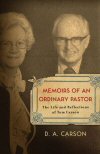
D.A. Carson’s father was a pioneering church-planter and pastor in Quebec. But still, an ordinary pastor-except that he ministered during the decades that brought French Canada from the brutal challenges of persecution and imprisonment for Baptist ministers to spectacular growth and revival in the 1970s.
It is a story, and an era, that few in the English-speaking world know anything about. But through Tom Carson’s journals and written prayers, and the narrative and historical background supplied by his son, readers will be given a first-hand account of not only this trying time in North American church history, but of one pastor’s life and times, dreams and disappointments. With words that will ring true for every person who has devoted themselves to the Lord’s work, this unique book serves to remind readers that though the sacrifices of serving God are great, the sweetness of living a faithful, obedient life is greater still.
This account gives us valuable insight into the life of a man who accepted the challenges of ministry with both integrity and grace, and into the life of a Protestant pastor in French Quebec. A powerful reminder that there are no little places if we are faithful to the God who called us.
—Erwin W. Lutzer, senior pastor, The Moody Church, Chicago, Illinois
How can the application of a Bible-saturated mind (Don’s) to a Bible-saturated life (Tom’s) produce an even more helpful story to encourage pastors? Let the ’mind’ be carried on a river of love because the ’life’ is his father’s. Then add a kind of narrative creativity. That’s how
—John Piper, chancellor, Bethlehem College and Seminary
A rare and precious gift from one of evangelicalism’s greatest scholars. How generous of Dr. Carson to bequeath his father’s quiet legacy to us all.
—C.J. Mahaney, senior pastor, Sovereign Grace Church of Louisville, Louisville, Kentucky
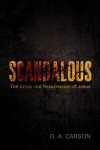
How are Christians to approach the central gospel teachings concerning the death and resurrection of Jesus? The Bible firmly establishes the historicity of these events and doesn’t leave their meanings ambiguous or open to interpretation. Even so, there is an irony and surprising strangeness to the cross. Carson shows that this strange irony has deep implications for our lives as he examines the history and theology of Jesus’s crucifixion and resurrection.
Scandalous highlights important theological truths in accessible and applicable ways. Both amateur theologians and general readers will appreciate how Carson deftly preserves weighty theology while simultaneously noting the broader themes of Jesus’ death and resurrection. Through exposition of five primary passages of Scripture, Carson helps us to more fully understand and appreciate the scandal of the cross.
Don Carson’s clarity in communicating Scripture is a great gift, and in this book, he gives it to us. This professor can preach. These are model messages on crucial passages. They are delicious meditations that instruct our minds and feed our souls. Biblical content—straight, ripped, hard, solid—this is what Carson gives us about Christ’s cross and resurrection. Read, mark, learn, and inwardly digest.
—Mark Dever, senior pastor, Capitol Hill Baptist Church, Washington D.C.
This is vintage Carson—informed exegesis and engaging exposition, theologically rich and devotionally warm, lucid, insightful, probing. God’s truth glows! Don Carson shows us what the Bible is for, and his words make me want to preach the scandalous cross of Christ with greater passion.
—Bill Kynes, senior pastor, Cornerstone Evangelical Free Church, Annandale, Virginia
Don Carson has provided a rich, thoughtful, and theologically honest introduction of the person and work of Jesus. With the biblical fidelity, clarity, and wisdom we have come to expect from his writings, Carson provides a treatment of the ironies of the cross not merely as a literary device but as a powerful analysis of the subversive, upside-down nature of the cross; namely, the powerful, redeeming, trusting king of the universe becoming a powerless, marginalized, and crucified savior. He believes that Jesus cried this cry, ’My God! I am forsaken?’ so that for all eternity we will not have to be. This is a scandalous picture of Jesus’ loving act of self-identification and self-donation for the godforsaken. We are grateful for his fruitful labors in showing us the irony of the mocked king who really is the king, not only for the Jews but also for the entire world.
—Stephen T. Um, senior minister, Citylife Presbyterian Church, Boston, Massachusetts

Too often the Christian version of popular culture’s sentimental view of love is that, of all things, Christians should be nice. After all, people ask, isn’t the Church about forgiveness? Aren’t Christians supposed to love others without condition?
This book not only focuses on the aspects of Christian love that are not easy–such as when it comes to loving our enemies, and even forgiving those loved ones who have hurt us–but also helps readers understand, then, what biblical love really is. As author D.A. Carson points out, thinking seriously about Christian love soon embroils us in reflection on justice, revenge, war, the authority of the state, forgiveness, hate, and much more. This book shows some of the important ways in which the love of Christians is a reflection of the love of God, and enables believers to develop an appropriate understanding of how to love in the hard places of life.
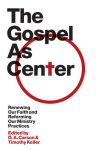
It’s time to reclaim the core of our beliefs... Important aspects of Christianity are in danger of being muddied or lost as relativism takes root in our churches today. What was historically agreed upon is now readily questioned and the very essentials of the Christian faith are in jeopardy. It’s time to reclaim the core of our beliefs.
To that end, D.A. Carson, Tim Keller, Kevin DeYoung, and other influential leaders have created this volume to defend the traditional gospel and to strengthen the church. The Gospel as Center will help you join in the movement—the movement dedicated to a Scripture-based reformation of ministry practices and the centrality of the gospel—and stand united under the conviction that what holds us together is worth fighting for.
About D.A. Carson
D.A. Carson is a premier New Testament scholar and research professor of New Testament at Trinity Evangelical Divinity School, where he has taught since 1978. He is president of the Gospel Coalition, and has written or edited nearly 60 books including Exegetical Fallacies, Second Edition, Showing the Spirit: A Theological Exposition of 1 Corinthians 12–14, and How Long, O Lord? Reflections on Suffering and Evil, and The Gagging of God: Christianity Confronts Pluralism.